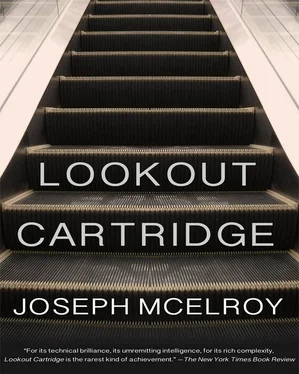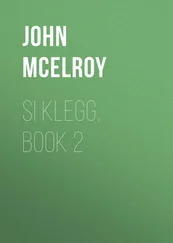Joseph McElroy - Lookout Cartridge
Здесь есть возможность читать онлайн «Joseph McElroy - Lookout Cartridge» весь текст электронной книги совершенно бесплатно (целиком полную версию без сокращений). В некоторых случаях можно слушать аудио, скачать через торрент в формате fb2 и присутствует краткое содержание. Год выпуска: 2014, ISBN: 2014, Издательство: Dzanc Books, Жанр: Современная проза, на английском языке. Описание произведения, (предисловие) а так же отзывы посетителей доступны на портале библиотеки ЛибКат.
- Название:Lookout Cartridge
- Автор:
- Издательство:Dzanc Books
- Жанр:
- Год:2014
- ISBN:9781941088036
- Рейтинг книги:3 / 5. Голосов: 1
-
Избранное:Добавить в избранное
- Отзывы:
-
Ваша оценка:
- 60
- 1
- 2
- 3
- 4
- 5
Lookout Cartridge: краткое содержание, описание и аннотация
Предлагаем к чтению аннотацию, описание, краткое содержание или предисловие (зависит от того, что написал сам автор книги «Lookout Cartridge»). Если вы не нашли необходимую информацию о книге — напишите в комментариях, мы постараемся отыскать её.
Lookout Cartridge — читать онлайн бесплатно полную книгу (весь текст) целиком
Ниже представлен текст книги, разбитый по страницам. Система сохранения места последней прочитанной страницы, позволяет с удобством читать онлайн бесплатно книгу «Lookout Cartridge», без необходимости каждый раз заново искать на чём Вы остановились. Поставьте закладку, и сможете в любой момент перейти на страницу, на которой закончили чтение.
Интервал:
Закладка:
But during the bad time in the late fifties, if I offered to cook she said it was one of the things she actually did. When Jenny and Will were in bed — Jenny the messy sleeper, Will neat, both snugly small asleep in bed — Lorna would stare at the blue air letter on the kitchen table or at the honey-varnished oak surface, or at an alumni review I never read which she might read, and if I came in for coffee she’d give me an ironic smile. Said I was keeping an eye on her.
She said her hair came out. I couldn’t see it. It was long, it was dark, it seemed thick. She had it cut and had a rat of her own hair made saying she expected to need it in a couple of years.
She said why did I begin my letters home Dear Mother and Dad when I didn’t write Mrs. and Mr . on the envelope.
She took her underwear off and stood at the mirror. She ran her hand along the pearly stretch-marks above her groin and said she was finished. I told her she was twenty-eight, she wouldn’t hit her prime for ten years. Holding her, I felt protective in my clothes. (A touch of porn too whole for film.) I said, You’re small — it was what I’d felt from the first. She said, Oh I’m not, I’ve never felt I was small. I squeezed her: But you are, and the only reason you don’t think so is that you were tall for your age till you were twelve.
All this is not the present point. Which is that into this ungrounded but so slowly spinning wheel came Tessa. She was not a friend of anyone we knew, though later I found that her American husband had known someone at the Embassy who knew Dagger.
Lorna met Tessa one Sunday at Kew. The ducks pedaled in toward Billy who had crawled near the water, I can barely see him he’s so small, though I was not there. Then Jenny who was then Ginny was trotting off toward two boys who were throwing grass and sassing a fat groundskeeper who seemed to be equipped with a slow fuse, while a third, in an attempt to hew down a tree, was hitting its trunk with a wooden sword. I was at home in Highgate. An elderly woman in a little round hat was saying — as if to anyone or to herself though in hopes of Lorna — that weren’t those boys terrible, got no respect — and instead of replying as she’d normally do no matter how she felt, Lorna turned away and spoke to a woman on her other side — asked what she was reading — and the woman said it was about a man who had collected 267 cowbells. But she said it without looking up from the book, so it came with the eeriest intimacy, neither English matter-of-fact friendliness nor anything else Lorna could think of except that Tessa — for this was Tessa — was a close friend (Lorna examined her), or a sister, with whom Lorna had come to Kew today. But after a while Tessa did look up; she looked at Jenny and Billy off playing, but not at Lorna; then she said, I’ll tell it you when I’m finished.
What passed between them that day I think I never learned. When Lorna came back she seemed less aware of me, indifferent though in a casual family way as she hummed through two stacks of music looking for something. And through her preoccupation which seemed to express a feeling she’d come home with, I saw she was elated. Whatever I don’t know, I know when she’s miserable and when she’s not. I took Jenny upstairs to wash and bandage her arm where one of the grass throwers had scratched her rather badly. When I came downstairs Lorna was empty-handed in the middle of the living room, behind her my sister’s photograph just above her shoulder, and the house seemed to be trying to return Lorna to the state she had seemed to be released from by the event of the afternoon, which as I’ve said was Tessa Allott. Lorna said she’d been repelled by the first woman trying to start a conversation in Kew Gardens and as soon as Lorna had turned to speak to the other person, a woman with the palest brown eyes — and indeed as if it could not happen until Lorna stopped watching Jenny — she got thrown down by one of the boys, thrown down again with some swiping motion that dug nails into her soft arm so it bled, and no doubt dirty nails.
There was apparently no place in my account of the Marvelous Country House for any of this — like later when Lorna was way past that trouble of the late fifties her remark that for her to meet Tessa, Jenny had to suffer that infected arm— septic , the English say — for it became infected — who knows where a nine-year-old’s nails have been? — Jenny would peel up the bandage to show Billy the scab crusting and would inform us over our lasagna that there was some white around the blue and the bloody-red — the tracks of the scratches were like whip-welts — Jenny was absorbed: She picked and picked, and the little disk of scab pried away too soon and what was left itched and she scratched it till it bled and Lorna had to take her back to the doctor.
Which is again not the point. The link of Tessa with the Marvelous Country House thirteen years later was too strong to omit in my diary. The meeting in Kew was May 1958. Ronald Colman died a year later in California — my mother devoted a letter to him. If you had told Tessa that Ronald Colman was born in Richmond, Surrey, she would have looked away with a wild smile and said with a quiet quiver you might mistake for a put-down, My goodness.
In June Lorna took Tessa to Royal Festival Hall to hear Menuhin — our neighbor in Highgate whom Tessa’s father had known for years — play Mozart and Bach concertos with the Festival Chamber Orchestra. On June 21 they took Billy and Ginny to the West End to South Pacific at the Dominion Cinema. I know, because summer solstice brought Stonehenge to mind — which we hadn’t even known was in Wiltshire — and with it all the other wonders of Britain that after four years’ residence we still had not seen. Ask a New Yorker if he’s seen the Chrysler Building lobby or any American tourist abroad if he’s been nearer the brink of the real Grand Canyon than an insurance company calendar. Well, in the paper next day was a report of Druid daybreak observances which Geoff Millan says have as little to do with Stonehenge as Welsh chapel services or Geoffrey of Monmouth’s erroneous account of the Dance of the Giants — though Geoff Millan can describe for me from New York Franz Kline’s great black forms against white canvas which seem some secret cross between ancient wood growths and the magic lintels in Wiltshire.
That June 21, 1958—scarcely a month after Lorna and Tessa had met at Kew — Tessa’s husband joined them at the movie and had a fit of sneezing in the middle of “Bali Hai.” The British Museum is only four blocks from that St. Giles Circus intersection where Tottenham Court Road, Charing Cross Road, and Oxford and New Oxford streets end and begin — and that was one of his Reading Room Saturdays at the BM. So after lunch instead of going somewhere to draw an old building in his sketchbook, Dudley Allott met them at the Dominion, and Lorna described him to me that evening. She was not sure what was between the Allotts, but she had this odd feeling Tessa was pregnant.
Not the point either; but maybe I’m thinking that Lorna never in any way described Tessa. Instead she would say — which was quite true when I had been with Tessa — that while Tessa sitting knees together and seeming in her narrow high shoulders tense or formal would never seem to do the talking, you might sometimes feel after she got up and went home that it was she who had moved the conversation — from Jews in New York, say, to Jews in London and the Brooklyn College girl who stayed with the Allotts one summer in the sixties who was surprised to find Tessa, a Jew, speaking with an English accent; yet Tessa brought us out — yet sometimes I discovered in myself, even in words I was using to tell anecdotes arising out of Tessa’s easy transitions, an idea that our lives had been parallel and what I was telling had happened to Tessa, who sat listening till Lorna would go to the piano and ask her to sing.
Читать дальшеИнтервал:
Закладка:
Похожие книги на «Lookout Cartridge»
Представляем Вашему вниманию похожие книги на «Lookout Cartridge» списком для выбора. Мы отобрали схожую по названию и смыслу литературу в надежде предоставить читателям больше вариантов отыскать новые, интересные, ещё непрочитанные произведения.
Обсуждение, отзывы о книге «Lookout Cartridge» и просто собственные мнения читателей. Оставьте ваши комментарии, напишите, что Вы думаете о произведении, его смысле или главных героях. Укажите что конкретно понравилось, а что нет, и почему Вы так считаете.












